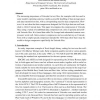Free Online Productivity Tools
i2Speak
i2Symbol
i2OCR
iTex2Img
iWeb2Print
iWeb2Shot
i2Type
iPdf2Split
iPdf2Merge
i2Bopomofo
i2Arabic
i2Style
i2Image
i2PDF
iLatex2Rtf
Sci2ools
100
click to vote
DCC
1998
IEEE
1998
IEEE
Compression of Unicode Files
The increasing importance of Unicode for text files, for example with Java and in some modern operating systems, implies a possible doubling of data storage space and data transmission time, with a corresponding need for data compression. However it is not clear that data compressors designed for 8-bit byte data are well matched to 16-bit Unicode data. This paper investigates the compression of Unicode files, using a variety of established data compressors on a mix of genuine and artificial Unicode files. It is found that while Ziv-Lempel and unbounded context compressors work well, finite-context compressors are less satisfactory on Unicode. Tests with a simple special compressor intended for 16-bit data show that it may be useful to design compressors specifically for Unicode files.
Compressors | Computer Graphics | DCC 1998 | Unicode | Unicode Files |
Related Content
| Added | 04 Aug 2010 |
| Updated | 04 Aug 2010 |
| Type | Conference |
| Year | 1998 |
| Where | DCC |
| Authors | Peter M. Fenwick, Simon Brierley |
Comments (0)

